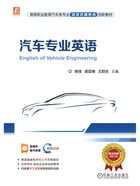
Chapter 2 Do you know anything about advanced manufacturing technology?
Unit 2-1 Flexible Manufacturing System
What is FMS?
A flexible manufacturing system (FMS) is a system that is capable of automatically manufacturing complete families of related parts. FMS is designed to work closely with group technology and just-in-time (JIT).
The main distinguishing feature of a flexible manufacturing system is central computer control over its operations without human operators 24 hours a day. These systems offer such benefits as:
1) Automatic production of many different types of parts and in random lot sizes.
2) Reduction in the number of setups and routing to produce parts.
3) Reduction in lead time.
4) Production of parts having consistent high quality.
5) Reduction in shop floor space.
6) Around-the-clock unstaffed production of parts.
How flexible manufacturing systems work
The concept of flexible manufacturing was developed by Jerome H. Lemelson, an American industrial engineer and inventor who filed a number of related patents in the early 1950s. His original design was a robot-based system that could weld, rivet, convey, and inspect manufactured goods.
Systems based on Lemelson's FMS inventions debuted on factory floors in the U.S. and Europe in the late 1960s and proliferated in the 1970s.
A flexible manufacturing system may include a configuration of interconnected processing workstations with computer terminals that process the end-to-end creation of a product, from loadingunloading functions to machining and assembly to storing to quality testing and data processing. The system can be programmed to run a batch of one set of products in a particular quantity and then automatically switch over to another set of products in another quantity.
The initials FMS are sometimes used to denote the term flexible machining system. The machining process is presently the largest application area for FMS technology. However, it seems appropriate to interpret FMS in its broader meaning, allowing for a wide range of possible applications beyond machining.
An FMS relies on the principles of group technology. No manufacturing system can be completely flexible. There are limits to the range of parts or products that can be made in an FMS. Accordingly, an FMS is designed to produce parts (or products) within a defined range of styles, sizes, and processes. In other words, an FMS is capable of producing a single part family or a limited range of part families.
A more appropriate term for an FMS would be flexible automated manufacturing system. The use of the word“automated”would distinguish this type of production technology from other manufacturing systems that are flexible but not automated, such as a manned GT machine cell. On the other hand, the word“flexible”would distinguish it from other manufacturing systems that are highly automated but not flexible, such as a conventional transfer line. However, the existing terminology is well established.
Types of FMS
FMS comes with its promise to enable manufacturers to achieve two conflicting goals, namely low volume and low cost production in response to rapid market changes. The key to such promise lies in the way flexibility is pursued in an FMS. Eight types of flexibility have been defined.
1) Setup or machine flexibility—the ability to make machine changeover of tools, fixtures, and programs to produce a new set of products.
2) Process flexibility—the ability to produce parts in different ways.
3) Convertibility or product flexibility—the ability to change the system to produce new products easily and quickly.
4) Routing flexibility—the ability to process a part through different routes so that production will not be interrupted in case of machine breakdown, labor shortage, or material unavailability.
5) Volume flexibility—the ability to run the system profitably at different production volumes.
6) Expandability flexibility—the ability to cost effectively expand the facilities as needed.
7) Operation flexibility—the ability to interchange the order of operations for each part type.
8) Production flexibility—the ability to produce a wide range of part types.